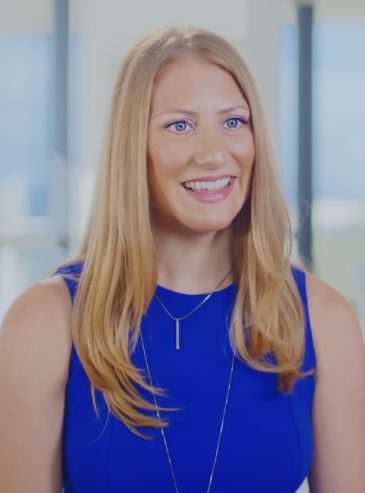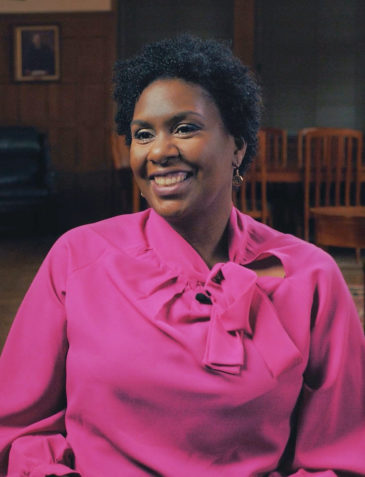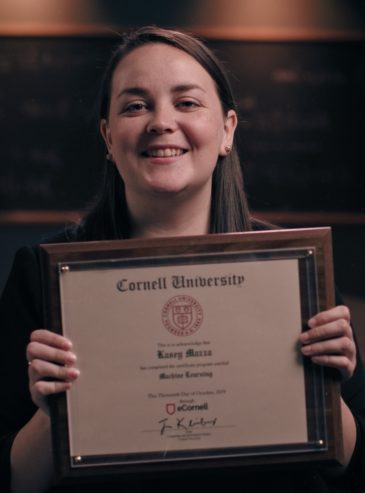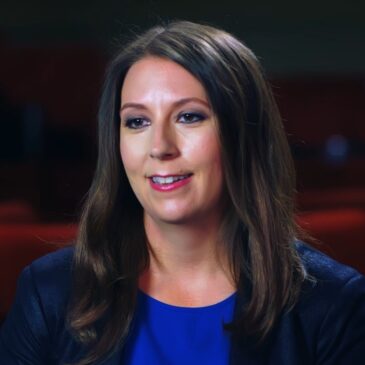STAND APART

Leaders at every level need to be able to execute on their ideas. In virtually every case, this means that leaders need to be able to persuade others to join in this execution. In order to do so, understanding how to create and utilize power in an organization is critical.
In this course, developed by Professor Glen Dowell, Ph.D., of Cornell University's Johnson Graduate School of Management, students will focus on their personal relationship with power as well as how power works in their organization and social network.
Project Management Institute (PMI®) Continuing Certification: Participants who successfully complete this course will receive 6 Professional Development Units (PDUs) from PMI®. Please contact PMI ® for details about professional project management certification or recertification.
- Feb 11, 2026
- Feb 25, 2026
- Mar 11, 2026
- Mar 25, 2026
- Apr 8, 2026
- Apr 22, 2026
- May 6, 2026
Being able to negotiate is a practical, everyday skill that is critical for anyone working within an organization. The good news is it's a skill you can practice and master. Negotiation skills are ones you can use in any context and, once you master the behaviors of effective negotiation, you will use all the time. In this course, developed by Cornell University's Professor Samuel Bacharach, Ph.D., you will develop an awareness that every conversation is a negotiation, and you will identify the critical components of effective negotiation.
- Feb 11, 2026
- Mar 11, 2026
- Mar 25, 2026
- Apr 8, 2026
- Apr 22, 2026
- May 6, 2026
- May 20, 2026
If you're in charge of developing and leading strategic organizational change, there are certain tools and concepts you must be familiar with. In this course, the emphasis is on cultivating your ability to assess the need for change. By determining why your organization or team needs change, you'll be able to better answer questions like: What should you change and how should the change be handled? You will explore the political and complex process of introducing change, which includes motivating others, dealing with resistance and the emotional elements of change, and finally, extending change over time and sustaining it. The course is designed to give you practice so you can initiate and carry out a change effort.
- Feb 11, 2026
- Mar 11, 2026
- Mar 25, 2026
- Apr 8, 2026
- Apr 22, 2026
- May 6, 2026
- May 20, 2026
All leadership is change leadership. Good leadership isn't about stagnation; it's about moving ahead. In this course, Cornell University's Professor Samuel Bacharach, Ph.D., explores the fundamental, practical skills that effective leaders have mastered.
Effective change leaders do three things; they anticipate where things are moving, they facilitate the implementation of change, and they sustain momentum by taking charge and moving things ahead. Great change leaders know how to be both proactive and reactive, as Professor Bacharach explains. Students in this course will examine their own leadership styles and practice skills that will help them translate ideas into organizational results, find ways to overcome organizational inertia, and examine strategies for overcoming individual resistance to change.
- Feb 11, 2026
- Feb 25, 2026
- Mar 11, 2026
- Mar 25, 2026
- Apr 8, 2026
- Apr 22, 2026
- May 6, 2026
- Feb 11, 2026
- Mar 11, 2026
- Mar 25, 2026
- Apr 8, 2026
- Apr 22, 2026
- May 6, 2026
- May 20, 2026
- Feb 11, 2026
- Feb 25, 2026
- Mar 11, 2026
- Mar 25, 2026
- Apr 8, 2026
- Apr 22, 2026
- May 6, 2026
- Feb 11, 2026
- Mar 11, 2026
- Apr 8, 2026
- May 6, 2026
- Jun 3, 2026
- Jul 1, 2026
- Jul 29, 2026
Leaders are responsible for encouraging the highest possible performance from their employees. Most leaders recognize that motivation is a key driver of high performance. Few leaders are skilled at choosing the right combination of approaches and tools to motivate all of their people. Cornell University Professor Risa Mish provides a learning experience that builds on the important premise that not all individuals are motivated by the same things, and some might be demotivated by the same conditions or incentives that motivate others. This course prepares leaders to analyze performance problems and assess whether they actually can be attributed to a lack of motivation or to one of several other root causes.
When students determine that poor workplace performance is indeed caused by a lack of motivation, they will use the motivation techniques that will be most effective for all the people involved. Leveraging the work of two American social psychologists to address the factors that may be demotivating people, students will learn how to increase the factors that do motivate people and improve workplace performance. Students will also use the three primary drivers of human motivation to foster better performance on the job.
- Feb 11, 2026
- Feb 25, 2026
- Mar 11, 2026
- Mar 25, 2026
- Apr 8, 2026
- Apr 22, 2026
- May 6, 2026
In an increasingly competitive global environment, quality is no longer considered a nice-to-have luxury. It's a requirement for successfully competing and surviving in the marketplace. While the concepts, tools, and procedures for quality and process improvement are now universally recognized and firmly placed in a large number of high-performing organizations around the world, it was not always so. The importance of quality in organizations has gone through a complete evolutionary cycle.
In this course, you will develop measures and standards of service quality, devise practices that improve employee learning and outcomes, and evaluate different approaches to process improvement, all based on the research and expertise of Cornell University Professor Rohit Verma, PhD. Using the tools provided in this course, you will be able to relate strategic decisions to their impact on organizational performance. And with the completion of an action plan at the end of the course, you will be ready to apply what you learn to your own organization.
- Mar 11, 2026
- Mar 25, 2026
- Apr 8, 2026
- Apr 22, 2026
- May 6, 2026
- May 20, 2026
- Jun 3, 2026
To be an effective leader, you must be able to articulate your thoughts and positions in a clear and concise manner.
Professor Angela Noble-Grange of Cornell University's Johnson Graduate School of Management draws on her own extensive experience as a speaker and communicator to guide students through the preparation and delivery process. She discusses how to identify the communication purpose and analyze your expected audience. She then shares how to formulate and rehearse your message, including how to pay attention to nonverbal communication.
To fine-tune these skills, this course includes interacting with fellow students. Students will participate in discussion forums and will record and share a video of a short presentation that serves as the course project. This provides rich opportunities for students to hone their communication and presentation skills in a practical way, and to learn from the efforts of others.
Participants in this certificate need a high-speed internet connection and a computer or device that can shoot digital videos with reasonable quality. The eCornell course delivery system provides the ability to record and upload videos, so you won't need special video software.- Feb 11, 2026
- Mar 11, 2026
- Mar 25, 2026
- Apr 8, 2026
- Apr 22, 2026
- May 6, 2026
- May 20, 2026
Managers who are seen practicing what they preach and following through on promises enjoy dramatically enhanced credibility and loyalty. They inspire workers to perform well and even to go beyond what is asked of them. Credibility is not all it takes to be successful, but no trust or meaningful relationship with those you manage can happen without it.
This course, developed by Professor Tony Simons, Ph.D. of Cornell University's School of Hotel Administration, focuses on this critical element of leadership, and helps students develop the awareness, skills and habits necessary for mastering it.
- Feb 11, 2026
- Feb 25, 2026
- Mar 11, 2026
- Mar 25, 2026
- Apr 8, 2026
- Apr 22, 2026
- May 6, 2026
One of the challenges organizations face today is how to innovate. Innovation has become the modus operandi of organizational life. Every organization needs to innovate quickly to stay competitive. But what does “innovation” really mean?
In simple terms, innovation is the practical application of creative ideas to drive organizational results; innovation results in something useful that benefits the organization. In this course, Cornell University's Professor Samuel Bacharach, Ph.D., clears away common misconceptions about the mystery surrounding this popular buzzword and identifies how individuals can harness creative energy to drive innovative results. Students will identify strategies for encouraging divergent thinking and examine methods of fostering a culture of innovation.- Feb 11, 2026
- Feb 25, 2026
- Mar 11, 2026
- Mar 25, 2026
- Apr 8, 2026
- Apr 22, 2026
- May 6, 2026
The ability to make effective and timely decisions is an essential skill for successful executives. Mastery of this skill influences all aspects of day-to-day operations as well as strategic planning. In this course, developed by Professor Robert Bloomfield, Ph.D. of Cornell University's Johnson Graduate School of Management, you will hone your decision-making skills by following a methodology based on tested actions and sound organizational approaches. You will leave this course better equipped to confidently tackle any decision large or small, and you'll do so in a way that creates the optimal conditions for success.
- Feb 11, 2026
- Feb 25, 2026
- Mar 11, 2026
- Mar 25, 2026
- Apr 8, 2026
- Apr 22, 2026
- May 6, 2026
With emerging technologies and expanding global marketplaces, it is imperative that organizations become highly proficient in driving their change agenda. Whether diversifying, downsizing, merging, reorienting business, or developing new management structures, organizations must be able to effectively carry out change initiatives to remain productive and competitive.
In this course, you will discover how to assess organizational readiness and your own ability to facilitate change. Working with a comprehensive organizational change management simulation, this experiential exercise provides an opportunity for you to learn by doing. By selecting and implementing strategies, you will see the rewards and consequences of your choices. You will also examine why the majority of change efforts fail, study change strategies, and determine how to fit them effectively to the stages of change. Finally, you will build an action plan for introducing a change initiative in your organization. In effect, this course enables you to begin building the skills and habits that you need to help make strategic or substantial change happen.
- Feb 18, 2026
- Mar 18, 2026
- Apr 15, 2026
- May 13, 2026
- Jun 10, 2026
- Jul 8, 2026
- Aug 5, 2026

eCornell was truly one of the best investments I made in my entire career and it’s what brought me to where I am now.
eCornell was truly one of the best investments I made in my entire career and it’s what brought me to where I am now.

What I wanted was something that had an exceptional caliber of professionals and professors, and eCornell actually gave me that.
What I wanted was something that had an exceptional caliber of professionals and professors, and eCornell actually gave me that.
- View slide #1
- View slide #2
- View slide #3
- View slide #4
- View slide #5
top Minds
100% Online
that fit your life and career.
career



